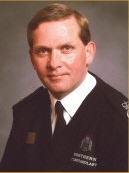NORTHERN CONSTABULARY BACKS ANTI-VIOLENCE CAMPAIGN Northern
Constabulary�s Chief Constable gave a key note speech at a major
conference today aimed at reducing violence in Scotland. Northern
Constabulary�s Chief Constable gave a key note speech at a major
conference today aimed at reducing violence in Scotland.Chief Constable Ian Latimer spoke of the devastating effect violence can have on communities across the country. The conference � �An Alliance for a Safer Future� � was organised by the Violence Reduction Unit. Opened by Justice Minister Cathy Jamieson MSP, the aim of the conference was to put violence reduction on everyone�s agenda. More than 250 delegates from a host of organisations including police, health, education, social work and enterprise, attended the event in Glasgow�s Royal Concert Hall. Speaking at the conference, Chief Constable Latimer, said: �The police service in Scotland is acutely aware of the impact violence has on communities throughout the country. While the impact may vary between urban housing schemes and rural villages, the negative and inhibiting affect on individuals and families is universal. We have, for some time, been aware that our efforts alone will not resolve the problem of violence, but rather concerted and co-ordinated action involving every individual and organisation with a responsibility or interest in reducing violence making Scotland safer for everyone.� Mr Latimer, who is chair of the ACPOS Crime Business Area, explained: �Our experience in Northern Constabulary in many respects, mirrors that of other areas. The person who is statistically most likely to become a victim of violence will be a young man aged between 16 and 20, and the perpetrator is also likely be a young man in the same age group. �The assault is most likely to happen on a Friday and Saturday, and it�s most likely that both will have been drinking. This is true across Scotland from Inverness to Glasgow. �These same age groups are the ones who are most likely to carry offensive weapons including knives. In last year�s figures in my own force, there were 210 cases of possession of an offensive weapon and 75 of carrying a knife. Now these numbers perhaps appear very small in comparison to some other Force areas, but the point, is we detected 75 people carrying knives, which represent the potential for serious violence - even murder.� Mr Latimer explained that police had dealt with the problem in the same manner for decades, yet levels of violence have remained relatively constant. He added: �In recent years we have successfully reduced the incidence of many types of crime. Crimes of dishonesty for instance, are at record lows and their decline has been consistent over the past decade. Our detection rates in Scotland for all types of crime are the envy of many Forces elsewhere. �Detection rates are often of little consolation to the victims of violence and we need to start looking at identifying and addressing some of the causes of violent behaviour, rather than treating only the symptoms. We want to try and prevent violence from happening in the first place.� Forces across Scotland, including Northern, have signed up to a year-long anti-violence campaign. The Safer Scotland campaign includes a knives and weapons amnesty which starts on Wednesday 24 May 2006. Mr Latimer added: �The challenge that violence presents cannot be tackled without committed and collaborative partnerships, focused on a shared agenda and a common aim. Violence affects us all, as citizens and professionals, it inhibits the aspirations of communities and individuals and it has been with us too long, but we have advantages in Scotland that make a sustained reduction in violence achievable. There is not doubt that change will take time, but we must be brave and make a start. �I give you my commitment and that of my fellow Chief Constables in Scotland, that we will work in real partnership with everyone to bring about the changes in attitude and society that will reduce violence for good, that will reduce the numbers of victims, that will increase communities wellbeing, that will make Scotland a safer place for everyone.� |